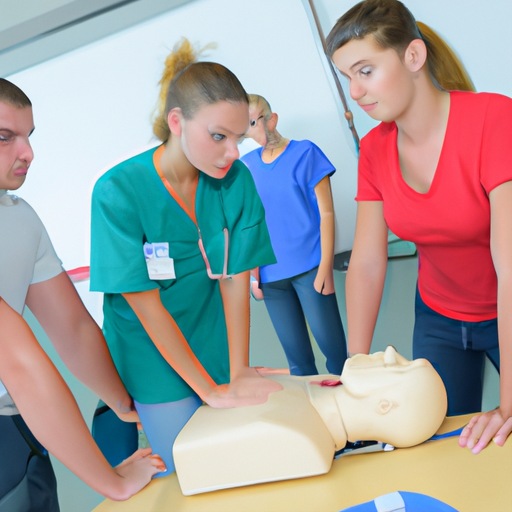The Surprising Mental Health Benefits of Learning CPR
Studies show that people who learn CPR tend to feel less stress and anxiety in emergencies and daily life. They also report greater feelings of personal accomplishment and self-esteem.
Learning a skill like CPR, challenges you physically and mentally. It pushes you outside your comfort zone in a controlled way. And when you master it, your brain gives you a boost of feel-good hormones that make you feel rewarded and proud of the accomplishment.
How does this work?
How Learning CPR Can Reduce Anxiety
So, learning CPR can do more than just prepare you for an emergency—it can actually help reduce your anxiety and boost your self-confidence.
Research even reveals that training children in CPR is critical. Investigators suggest that the best training age is around 12.5 years old. The sooner people become aware of the importance of these skills, the better.
Have you ever felt helpless in stressful situations? Learning CPR gives you the ability to take action in a crisis. Knowing you have the skills to potentially save a life can help alleviate feelings of panic and anxiety.
Studies show that the majority of bystanders who know CPR feel less distressed and are more able to respond in an emergency. The training process itself also helps desensitize you to panic and upset.
Performing CPR on a mannequin during a class allows you to experience what it feels like to take action in an emergency so you’ll be ready for an emergency event.
Learning life-saving skills boosts the learner’s confidence
Learning a new lifesaving skill like CPR boosts your confidence in other areas of life as well. Mastering CPR demonstrates that you have the ability and wherewithal to apply what you’ve learned in high-pressure situations. This can translate into greater confidence at work, in relationships, and in handling unforeseen problems or other crisis events
Knowing CPR also gives you peace of mind that you can help when others need you. You’ll feel more at ease in public or at social gatherings, secure in the knowledge that you can take action if someone experiences a cardiac arrest or stops breathing.
So, while learning CPR prepares you for an emergency, its benefits go far beyond that. Gaining this lifesaving skill gain control—even when faced with situations that feel almost impossible.
Psychological First Aid
People who become traumatized from high-stress emergency situations may need to receive psychological first aid.
The more you become involved in CPR learning, the more you’ll understand the idea behind PFA – for you or the victim. PFA is designed to ensure an environment of calmness, connectedness, safety, self-empowerment, and hope.
Some of the Challenges of Layperson Rescues: Why You Need to Train Onsite
When CPR is initiated by bystanders, the survival rate of out-of-hospital cardiac arrest (OHCA) increases notably.
If a lay rescuer does not receive onsite CPR training however, they may hesitate to provide emergency assistance in the following situations:
- They’re unable to determines the seriousness of a victim’s condition;
- They’re worried about getting an infectious disease;
- They feel incapable and unsure;
- They’re worried about legal implications; or
- They’re concerned about physically harming the patient.
That is why you need to receive CPR/AED training at a community site. You can get the hands-on experience you need so you’re better able to handle some of the concerns that may arise during a rescue attempt – a time when every second counts.
While knowing CPR can boost your level of confidence, you also have to know how the training you select can impact your overall well-being and eventual medical outcome and health of the victim.
The Benefits of Receiving Certification
When you complete a CPR certification course in your community, you’ll feel empowered in other areas of your life as well.
A knowledge of CPR gives you:
A sense of purpose
Knowing CPR makes you feel like you have a sense of purpose – you have the knowledge and ability to help in a crisis. That provides a mental reward of feeling self-assured and capable.
A useful skill for life
CPR is a skill that’s useful for life. You never know when you might need to perform it, whether on a loved one, friend, coworker or stranger. Graduating from a CPR course means you can act as a first responder if someone experiences a sudden cardiac arrest (SCA), and that’s a great feeling.
The ability to teach others your new skill
Once you become CPR certified, you’ll have the ability to teach friends and family this lifesaving skill as well as local residents. Passing on this knowledge to others in your community gives you a chance to pay your skills forward.
Continuous Learning and Improvement: Recertification
To remain certified in CPR, you must renew your certification every two years. This means practicing and refreshing your skills on a regular basis. Repeating CPR training gives you an opportunity to strengthen your competence over time.
You’ll feel good in knowing that your life-saving skills are up-to-date. Overall, learning CPR has significant psychological benefits in addition to the obvious physical ones.
Final Thoughts
Equipping yourself with the life-saving skill of CPR will give you a sense of control and empowerment, helping you stay calm enough to get through an emergency.
Regular recertification and practice can reinforce these mental health rewards and give you the peace of mind so that you’re always ready to help if needed.



